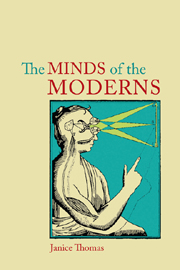Book contents
- Frontmatter
- Contents
- Acknowledgements
- Abbreviations
- Introduction
- I Descartes
- II Spinoza
- 6 Is the mind a substance for Spinoza?
- 7 Spinoza and self-knowledge
- 8 The subject of thought and consciousness
- 9 Spinoza and mental causation
- 10 Spinoza on representation
- III Leibniz
- IV Locke
- V Berkeley
- VI Hume
- Conclusion
- Bibliography
- Index
6 - Is the mind a substance for Spinoza?
from II - Spinoza
- Frontmatter
- Contents
- Acknowledgements
- Abbreviations
- Introduction
- I Descartes
- II Spinoza
- 6 Is the mind a substance for Spinoza?
- 7 Spinoza and self-knowledge
- 8 The subject of thought and consciousness
- 9 Spinoza and mental causation
- 10 Spinoza on representation
- III Leibniz
- IV Locke
- V Berkeley
- VI Hume
- Conclusion
- Bibliography
- Index
Summary
It is something of an irony that Spinoza's thoroughgoing dedication to some of the basic principles of Cartesian thought results in his concluding that the human mind is not a substance. Spinoza believes that if you follow Descartes's principles to what he regards as their logical conclusion you wind up a monist, not a substance dualist. In fact, for Spinoza there is only one individual substance and that one substance is, and can be, nothing less than the whole of reality. Reality or nature is a single substance, a single individual that exists necessarily and is characterized throughout by both the attribute of extension and the attribute of thought. As we shall see, Spinoza is neither an idealist nor a materialist since he thinks that every bit of reality has both a mental facet and a physical or material one so that every portion of reality is through and through both ideal (of the nature of ideas) and material (extended). As he writes, “The mind and the body are one and the same thing, which is conceived now under the attribute of thought and now under the attribute of extension” (E3p2s).
So, although the main lines of Spinoza's theory of mind are expounded in Part 2 of the Ethics, large constraints on that theory have already been spelled out in Part 1. Spinoza defines “substance” as “what is in itself and is conceived through itself; that is, that whose concept does not require the concept of another thing, from which it must be formed” (E1d3).
- Type
- Chapter
- Information
- The Minds of the ModernsRationalism, Empiricism and Philosophy of Mind, pp. 61 - 69Publisher: Acumen PublishingPrint publication year: 2009

